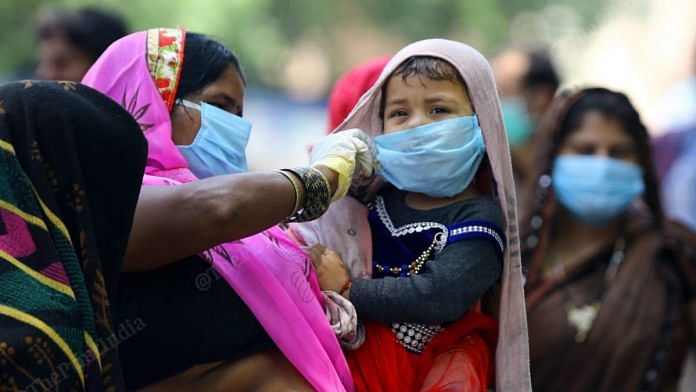New Delhi: The Narendra Modi government is planning to organise home delivery of folic acid, calcium and zinc tablets, oral rehydration solution sachets and contraceptives in containment zones to plug the loopholes in mother and child healthcare under the Covid-19 lockdown.
Areas where Covid-19 cases are reported have been classified as ‘containment zones’, and the surrounding areas are called buffer zones.
ThePrint has learnt that the government has asked states and union territories to deliver all essential services under a programme named ‘reproductive, maternal, newborn, child, adolescent health plus nutrition services’, or RMNCAH+N. The programme was launched in 2013 to improve the health of mothers and children, whose survival is central to the achievement of goals under the country’s flagship National Health Mission (NHM).
“Under no circumstances should there be a denial of essential services,” Preeti Sudan, Secretary, Health and Family Welfare, said in a letter dated 24 May, in which she also asked states to treat drugs and commodities required for continuing RMNCAH+N services as “essential commodities”.
“Critical services for women, children and adolescents should be provided irrespective of their Covid status,” said the letter, which has been accessed by ThePrint. “Covid-19 pandemic has demanded additional attention of our healthcare system. It is vital that during this period the essential RMNCAH+N services are not affected,” it added.
The letter has been marked to additional chief secretaries, principal secretaries and secretaries (health) of all states and union territories, along with mission directors of the NHM.
Also read: ICMR & Lancet HCQ study aren’t at odds. One is on preventing Covid, other about treating it
Urgent need
A recent study by the US-based Guttmacher Institute, a leading research and policy organisation, has found that “even a modest decline of 10 per cent in coverage of pregnancy-related and newborn healthcare would result in an additional 28,000 maternal deaths and 168,000 newborn deaths”.
In India too, the impact of Covid-19 on reproductive and maternal care services is evident. The NGO Foundation for Reproductive Health Services India conducted a study based on the scenario that family planning services would return to full operation by September 2020.
The estimates it arrived at — based on data from the Union health ministry along with social marketing statistics and retail audit data — suggest as many as 2.56 crore couples may not be able to access contraception services until September.
According to the study, this would likely result in an additional 23.8 lakh unintended pregnancies and 14.5 lakh abortions, of which 8.34 lakh might be carried out by quacks in the absence of access to a trusted medical facility.
Guidance document
A guidance document attached with the health secretary’s letter also highlighted the urgency of ensuring healthcare for mothers and children. “With more than 2.5 crore pregnancies each year in the country, it is important to ensure the availability of services during this period as any denial of services can have an impact on maternal and newborn mortalities, morbidities as well as the health care costs,” it said.
“Unwanted pregnancies have a negative impact on maternal and newborn health. Regulating fertility is thus a necessity. There is a need to enhance the provision of safe abortion services besides post-partum and post-abortion contraception,” Sudan added in the letter.
“Each state and union territory needs to ensure access to these services in order to avert the increased risk of morbidities, unwanted pregnancies and mortalities, thereby ensuring the health and well-being of mothers and children,” she said.
The guidelines in the document state that “any area exiting a ‘containment or buffer zone’ can start RMNCAH+N activities as listed in ‘areas beyond buffer zone’ after a minimum gap of 14 days following delisting”.
Similarly, an area entering a ‘containment/buffer zone’ should restrict RMNCAH+N activities immediately as outlined in ‘Containment/Buffer Zone’.
While several private hospitals were pushing for mandatory Covid-19 tests for every patient being admitted for basic procedures such as dialysis or chemotherapy, the Centre has clarified that the testing is not mandatory for RMNCAH+N services.
The central government has allowed states and UTs to involve not-for-profit and private sector hospitals to provide non-Covid essential services, wherever public sector capacity needs to be supported. “In case the number of beneficiaries is more, then additional sessions or clinics could be organised,” the guidelines state.
“All these facilities should follow a staggered approach, wherein adequate seating space for beneficiaries and caregivers with physical distancing is ensured,” the government said, adding that teleconsultation services are to be promoted at all levels to prevent overcrowding and reduce chances of infection.
Also read: 60 districts, 10 cities — how ICMR is going deep into India’s heart to chart Covid course



